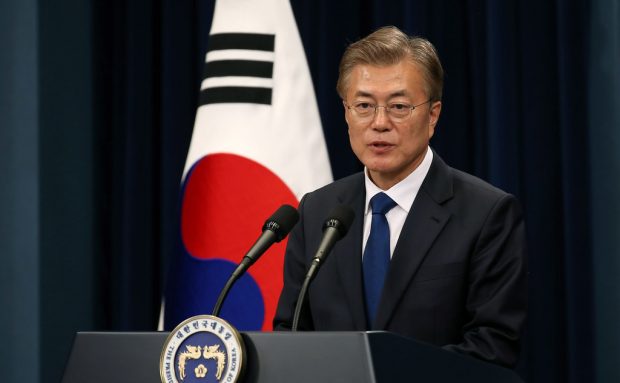
Moon urges innovative growth to counter Japan’s trade pressure

President Moon Jae-in said Monday his government will redouble its push for innovative growth in South Korea’s manufacturing sector, especially by nurturing globally competitive startups, as part of a long-term response to Japan’s trade pressure. He pointed out that Tokyo’s export restrictions have added to the economic troubles facing Asia’s fourth-largest economy amid the exacerbation of global economic conditions. “The government is preparing thoroughly for short-term and fundamental measures, along with efforts for a diplomatic resolution,” Moon said at the outset of his weekly meeting with senior Cheong Wa Dae aides, open to the media.
He added, “In a situation where technological hegemony, undermining the free trade order, threatens the national economy, the creation of innovative businesses, based on new technology, can be an important solution.” He called for innovation particularly in the component and material production fields. The president said challenges from Japan’s export control targeting South Korean firms could result in an opportunity for them. “Taking the current difficulty as a chance, the government won’t spare any state-level support for the strengthening of the parts-materials industry and innovation in the manufacturing sector,” he added. He asked local conglomerates to step up efforts to create a win-win situation with small and medium-sized enterprises (SMEs).
Many domestic SMEs, even if they have developed new technologies or products, have failed to join the supply chain, Moon said, apparently referring to larger companies’ heavy reliance on imports from Japan and other nations. “I stress that the government, conglomerates, and SMEs should form an emergency support/cooperation system together” to enhance the competitiveness of related industries, he said. He expressed hope for the emergence of far more South Korean “unicorns” — startups with a total asset value of over US$1 billion — in the field.
Early this month, Japan slapped tougher regulations on the shipment to South Korea of three key materials used in memory chips and digital screens. It came in apparent retaliation over historical issues. Tokyo is also moving to remove Seoul from a white list of more than two dozen trusted importers. Moon described Japan’s move as a reminder of the importance to South Korea of securing industrial competitiveness in order to continue “equal and mutually beneficial” trade with Japan. The president called for a “can-do” spirit.
South Korea has succeeded in outdoing the neighboring country in a number of industries, such as home appliances, electronics, semiconductors, and shipbuilding, despite Japan’s earlier supremacy, he said. He also took note of a tourism deficit dogging South Korea. Last year alone, the number of outbound tourists totaled nearly 30 million, while that of incoming visitors stood at half that number, resulting in a 13.2-billion-dollar deficit in tourism accounts. He instructed the government to focus efforts on vitalizing the domestic tourism industry.
By Lee Chi-dong
(Yonhap)


